Couple Transform Drought-Hit District by Helping 400 Farmers Go Organic
Karnataka-based couple Valliammal Krishnaswamy and Rajan Palaniappan run Anisha, an NGO that trains farmers and school students in organic farming, helping hundreds take it up and earn a better living.
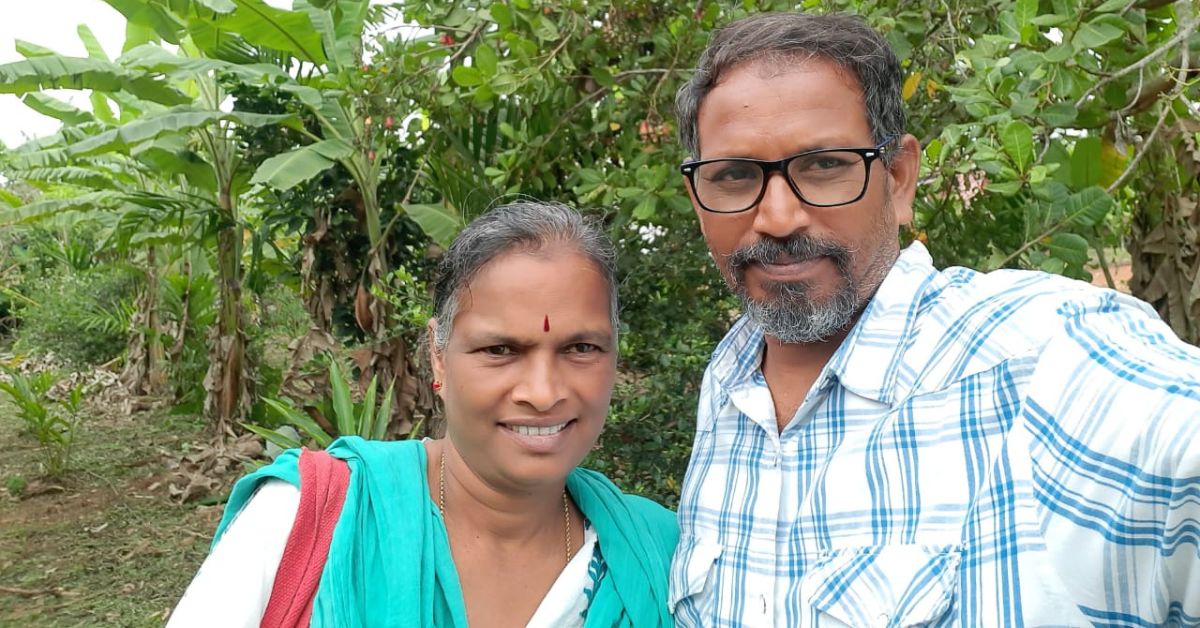
Against the backdrop of the Male Mahadeshwara Hill range, a biodiversity hotspot where the mighty Western and Eastern Ghats converge, Valliammal Krishnaswamy and her husband Rajan Palaniappan have been brewing a rural revolution for the past 16 years.
Through their NGO Anisha, the couple has been working relentlessly to improve the livelihoods of the farming community in the drought-prone Chamarajanagar district of Karnataka by promoting organic farming.
The NGO was started in 1994 by Valliammal, Rajan, and their friend Srinivasan, while they were pursuing their LLB in Bengaluru.
Anisha, which translates to “from darkness to light”, then worked to engage street children in Bengaluru in educational activities.
“Working with those children gave me initial insight into the issue of migration from villages. Their parents had given up farming due to declining productivity and migrated to the cities looking for greener pastures,” Valliammal tells The Better India.
The issue resonated with her on a different level, as her parents themselves had migrated to the city long ago from their villages.
In 2004, when she was visiting her husband’s village in Nallur, Chamarajanagar district, she noticed that most villagers there had either switched to chemical-based agriculture or abandoned farming and migrated to different places.
“The villages of Chamarajanagar depend mostly on farming, but the issue of low productivity has been weighing them down for years. The region is a rainfed area and depends highly on monsoons, as irrigation has always been difficult. But monsoons have not been very kind to them either. I saw vast patches of land that were abandoned there,” says Valliammal, who holds an MA in Sociology and an LLB.
Meanwhile, Rajan, who grew up in the fields of Nallur village, recalls that the region had extensive cultivation but has changed tremendously over the years. “Long ago, during the time of my grandparents, people used to practice only organic or natural farming. Over the years, they shifted to chemical farming for higher benefits and profitability, which affected the soil fertility and productivity,” he notes.
Motivated to understand the issue and find a solution, in 2006, the couple shifted their focus to rural development by promoting organic farming and ensuring food security in these villages. They shifted their NGO to Martalli in Kollegal Taluk of Chamarajanagar.
So far, they have been able to train over 2,000 farmers in organic farming and have helped set up over 400 kitchen gardens in and around 20 villages across the Martalli region.
An effort to reinstate organic farming
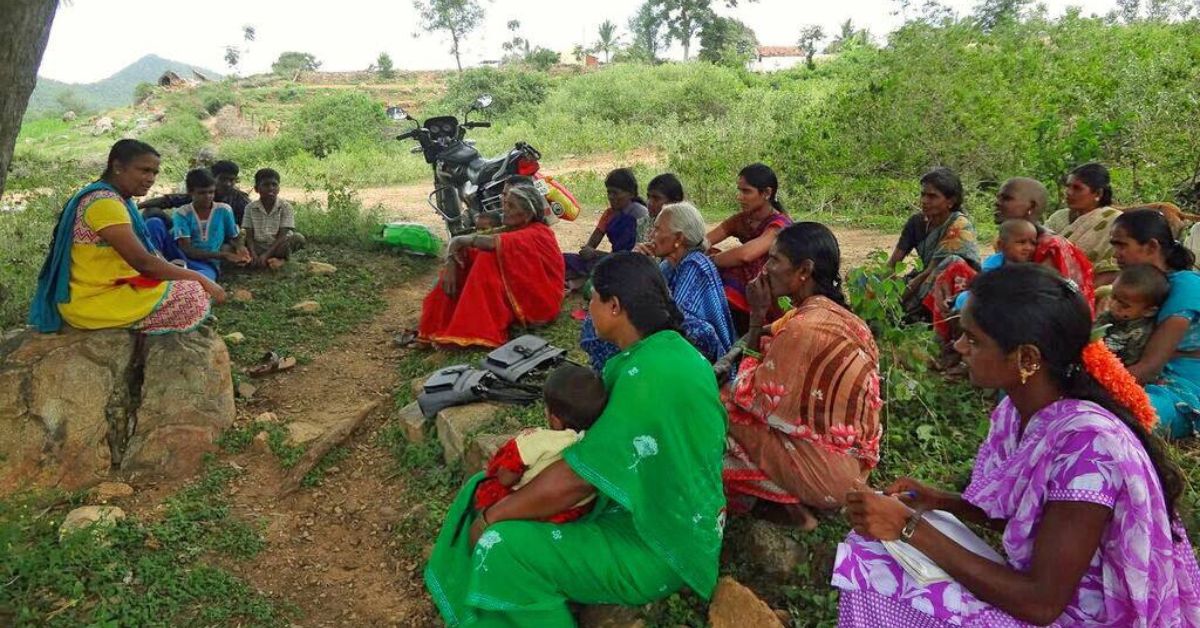
As an initial step, Valliammal interacted with different farmers in the area. She found that the older generation still endorses natural methods of farming and doesn’t support the idea of using chemicals. “They say if bhoomi thayi (mother earth) hasn’t given any yield this year, then she would definitely provide it next year. Then what’s the point of spoiling the fertility of the soil by infusing such chemicals?” says the 51-year-old.
Soon, Valli and her friend Srinivasan started visiting different villages across the Martalli region and conducting orientation classes for farmers to create awareness about the disadvantages of chemical farming.
“It wasn’t easy to convince them, as they had many apprehensions about switching to organic farming. So we took it as a challenge and asked them to give us a small piece of land to show them how to do it successfully,” she says,
The farmers allotted them land next to their chemically laden farm. “We helped them ready the given land for organic farming and adopt natural methods for cultivation. All this was done while they were simultaneously involved in chemical farming on the other side. From the results, we proved to them that organic farming is possible and more cost-efficient than chemical farming,” she adds.
Valli says that their aim was to make the farmers self-sufficient in their ventures.
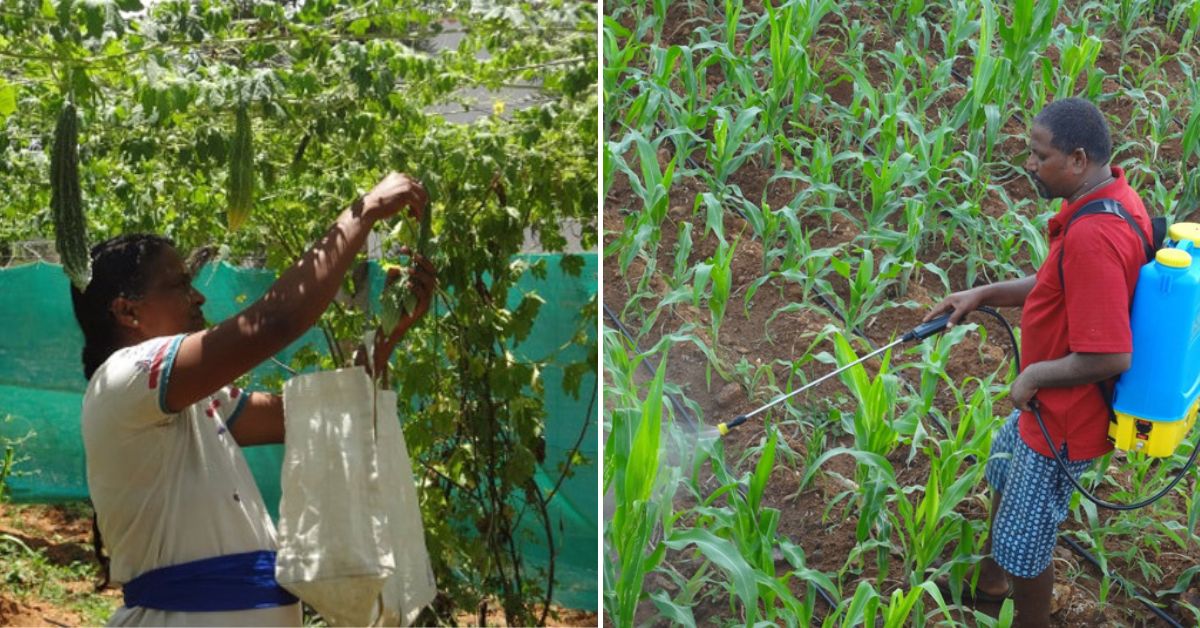
“We taught them how to set up their soil for organic cultivation, to use native seeds instead of hybrid seeds from the shops, and prepare their own organic fertilisers or pesticides at home. This helped them cut down expenses and increase the value of their produce. We provided them with A to Z guidance,” she explains.
“Since 2006, we have been able to train over 2,000 farmers in and around 20 villages. Among them, around 400 are currently practicing organic farming,” she adds.
John Joseph, a farmer from Martalli, has been organic farming for the past six years after receiving training from Anisha. He says that switching from chemical farming has been more profitable.
“They trained us in making different fertilisers and pesticides using organic inputs like cow dung, urine, compost, etc. This helped me reduce the expense of buying chemical fertilisers. This has also been giving me a very good yield. I started earning more than I used to earn before, as the organic produce has more value in the local market,” says John, who grows several fruit trees like sapota, bilimbi, and mangoes, as well as vegetables like spinach, coriander, and so on.
Sowing seeds of hope and conservation
While embarking on a mission to promote organic farming among villagers, Anisha also tried to set up a seed bank for the native seeds.
“As we were propagating organic methods it was important to provide people with native seeds and healthy varieties. Therefore, we set up a seed bank by sourcing native seeds from different parts of the country and systematically testing and documenting how it would grow in the Martalli region. Later, we would distribute it to farmers for free,” explains Valiammal, adding that the NGO has a research centre and a 9-acre working farm for the testing of seeds and fertilisers before reaching it to the villagers.
She says that farmers, after multiplying the seeds, are taught to save native seeds for the next year. They are also requested to return at least double the number of seeds to the bank after the harvest. “Currently we have more than 300 varieties of vegetables, millets, oil seeds, and more,” Valli says.
The NGO also helped landless labourers who only have limited spaces around their homes to grow their own vegetables. This initiative was aimed at helping these households to reduce expenses and also provide their family healthy nutrition.
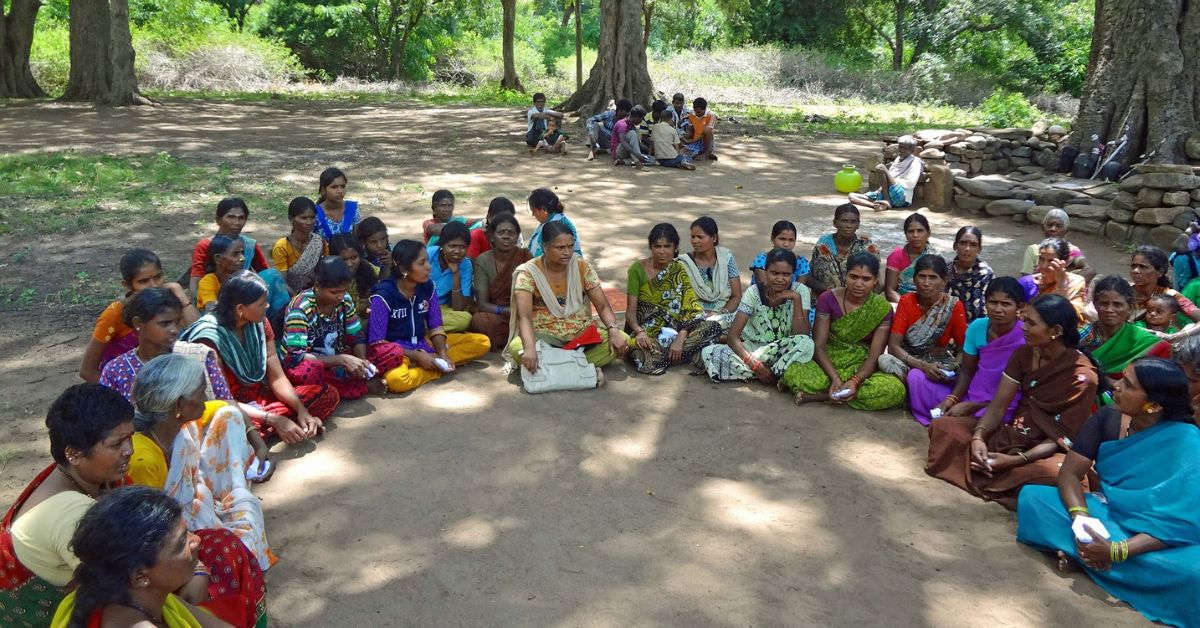
“Men in these families either work in rock quarries or in another state, living away from home. But the women have a chance at cultivating at least a few vegetables in their available space at home. So we started distributing vegetable seeds and providing them training in how to set up kitchen gardens,” explains Valli. “Currently, we have helped to set up around 410 kitchen gardens in 20 villages.”
In 2016, Anisha expanded the work to students by helping them set up organic school gardens in their schools.
“We worked with 23 schools in three panchayats, with around 1,500 students between 2016 and 2020. With permission from the education department, we have conducted training and orientation classes in organic farming and provided them with seeds required for the initiative,” says Rajan.
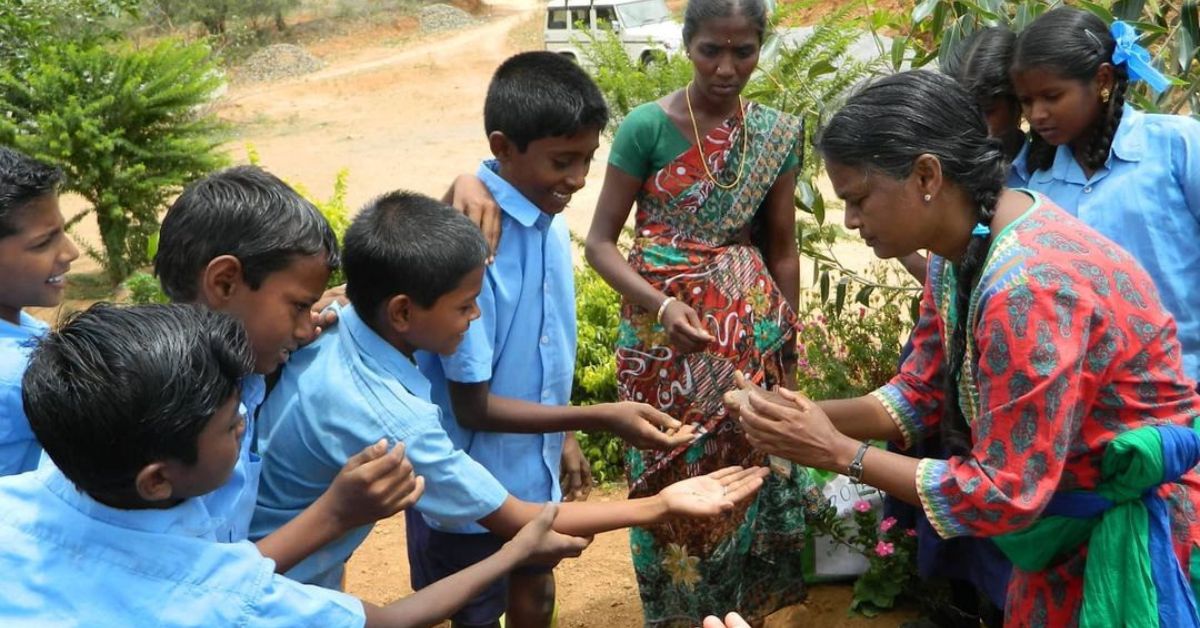
“We also teach them to save the seeds and request them to return them to the bank if possible. Several students have taken up farming at their own houses,” he adds.
John Britto, a teacher at Government Lower Primary School in Godest Nagar near Martalli, says, “Anisha came to our school in 2016, and ever since, we have been cultivating our own vegetables in our school compound. They trained our students and provided them with seeds and tools to set up the vegetable garden.”
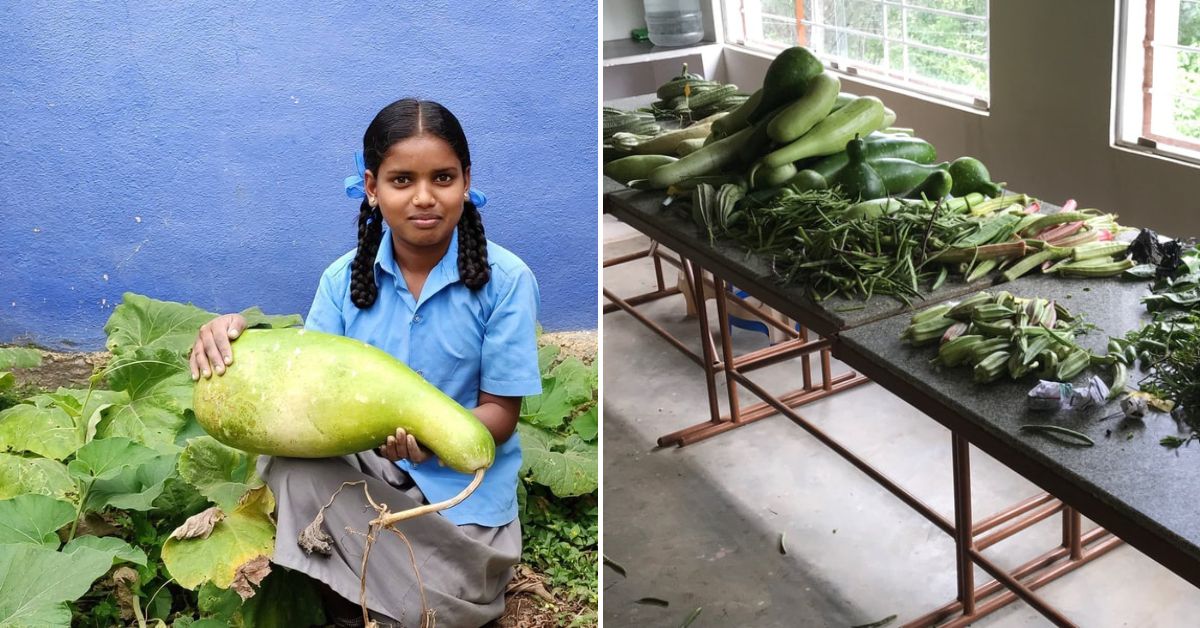
“Teachers and students have been equally involved in the farming efforts. Now we grow tomatoes, radish, brinjal, chilli, moringa, etc and have been including all the produce in our mid-day meal. We are glad that we could provide more nutritious food to our students, thanks to the training and continuous guidance from Anisha,” he says.
Anisha provides schools with whatever they need to help these vegetable gardens flourish. “Currently we are working with 30 more schools in the Hanur taluk,” says Rajan.
Edited by Divya Sethu
This story made me
- 97
- 121
- 89
- 167
Tell Us More
We bring stories straight from the heart of India, to inspire millions and create a wave of impact. Our positive movement is growing bigger everyday, and we would love for you to join it.
Please contribute whatever you can, every little penny helps our team in bringing you more stories that support dreams and spread hope.



















